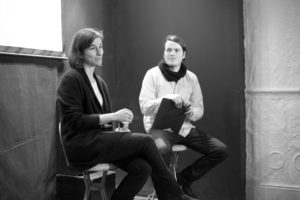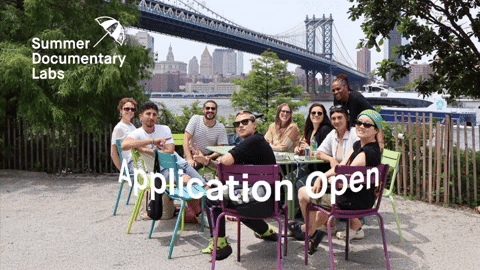Audience Member #6: Just curious about the art show—did you know before you started shooting that she was going to be awarded the art show? If she hadn’t gotten that, so where do you think the film was going to go?
YM: I don’t know, I guess we would’ve had to find another arc. We started shooting her and then it came up that she given that. But to me, it was one of the most heart-wrenching moments because she never speaks to her mother at the show.
Audience Member #7: How much coordination goes into what you’re speaking about? With the producers more focused on the impact and with the directors more focused on the story, how much space do you guys have to give each other to maneuver and both come out winning?
YM: We were a lot of different groups. Some of us are in D.C., some in New York. Out of our different interests and time availability, having more people was an incredible blessing. One of the producing partners, ShineGlobal, is a not-for-profit company whose goal is to focus on stories of kids to try and end their exploitation worldwide. Having their expertise on board was essential, and our ability to collaborate in terms of sheer manpower was very useful. It’s made me very thoughtful for other projects going forward, trying to have a bigger team in place. We were strategizing outreach early on, like five months before the final cut.
That work didn’t directly affect what the directors were doing.  We never said “Could you put in a bit more homelessness? Because that would help us.” That would have been a mistake. But we were able to say, how can we draw those themes out from the story to help us from an advocacy perspective? We had this brainstorming session at MTV’s offices with groups like Covenant House, Coalition for Homeless, and Dreamyard, an organization that provides arts education in the Bronx. We brainstormed for half a day about how could they use this film for their own purposes and how we might be able to use their networks. Even though not everything we discussed was implemented, being able to talk about it made us all better advocates. And that’s having a lot of benefits now as we move forward.
We never said “Could you put in a bit more homelessness? Because that would help us.” That would have been a mistake. But we were able to say, how can we draw those themes out from the story to help us from an advocacy perspective? We had this brainstorming session at MTV’s offices with groups like Covenant House, Coalition for Homeless, and Dreamyard, an organization that provides arts education in the Bronx. We brainstormed for half a day about how could they use this film for their own purposes and how we might be able to use their networks. Even though not everything we discussed was implemented, being able to talk about it made us all better advocates. And that’s having a lot of benefits now as we move forward.
Audience Member #8: I’m just curious what issues were brought up on the Hill and what the response was.
YM: We showed the film to a number of staff members. There were a lot of great questions but one of the issues is that they’re trying to reconvene the caucuses that they had last year which is proving difficult because there are very few moderate Republicans. For example, it’s not clear that the caucus on homelessness will actually reconvene to talk about homelessness because there isn’t a Republican who wants to co-sponsor it. One of the productive discussions was how can the film be used to help identify or convince potential representatives to say this caucus is actually really important. Our visit gave us insight into how slowly things change. It was eye opening. It was great having Inocente sitting at the tables of representatives…
Audience Member #8: How much do you think the film had an effect on the family receiving legal status or her receiving legal status?
YM: I think it was the people who were friendly with the arts program she was in and all of this attention on her that helped her and her family get legal status.
Audience Member #9: What was the incentive for you, as a producer, to come on this project, since short films don’t make money or get seen that often?
YM: This film started as a different project which we had financial backing for…But things changed and we reached a point where we thought it was going to fall apart but then we told ourselves, no, no it’s not. It was a team effort.
Audience Member #9: Was it supposed to be a feature?
YM: It was supposed to be a feature on three teenagers but when we decided to just focus on Inocente, we also decided to make it a shorter piece… From having been through the festival process on other films, it was hard to get a film like this into a festival because programmers have slots for features or shorts in front of features. You can’t put Inocente in front of a feature. There are very few slots of this length. But it turns out this is a much better length for education, for advocacy, for a Hill screening…
Audience Member #10: How did MTV come in?
Yael Melamede: They came in toward the end and with the help of our producing partner Albie Hecht and Shine Global, when we were showing around the rough cut. MTV loved it. It was very unexpected. MTV has a great advocacy arm called act.mtv.com and they promoted the film a lot through there. It all came together at the right moment as we were finishing the film. They gave us the final confirmation that it was right as a shorter film.





